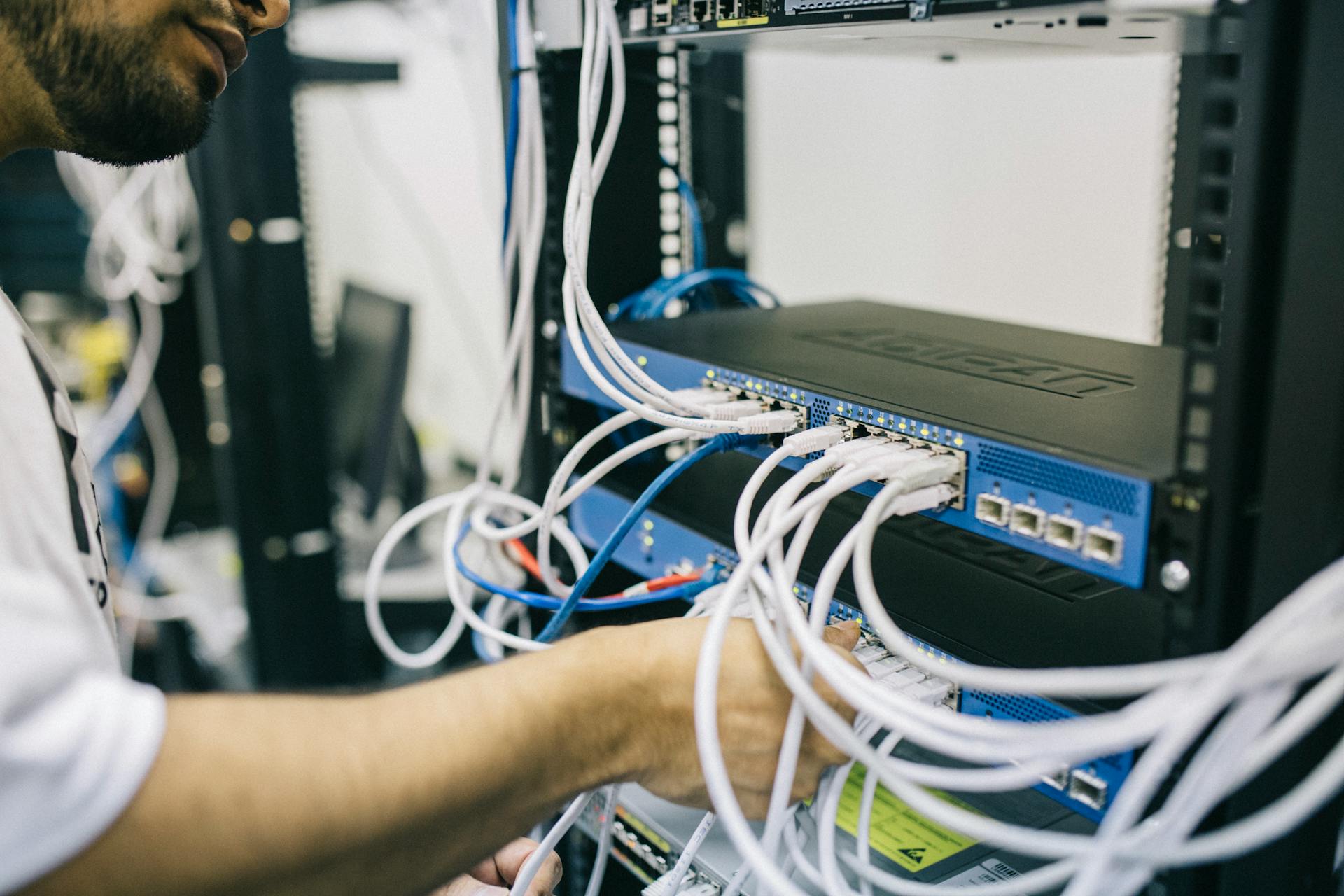
Sharia compliant finance is a system of finance that is guided by Islamic principles and laws. It's based on the idea of fairness, justice, and the prohibition of excessive risk-taking.
In Sharia compliant finance, investments are screened to ensure they meet certain criteria. This means no investments in companies that deal in pork, alcohol, or other haram activities.
Sharia compliant finance has several forms, each with its own unique features. One of the most well-known forms is Sukuk, which is a type of Islamic bond that allows investors to participate in the financing of a project or company.
Sukuk is structured to provide a regular return to investors, typically in the form of a coupon payment. This is in line with the Islamic principle of sharing profits and losses.
Worth a look: Islamic Sharia Banking
Principles
The principles of Sharia compliant finance are rooted in the Islamic faith and are based on the Quran and the teachings of the Prophet Muhammad. Shariah is the legal code of Islam that governs all aspects of life, including finance.
At its core, Sharia compliant finance prohibits usury and speculation, which are considered haram (forbidden) in Islam. This means that financial transactions must be based on mutual benefit and risk-sharing, rather than exploitation.
One of the key principles of Sharia compliant finance is the prohibition on riba, which is often translated as interest. However, it's not just about interest rates – it's about the concept of charging a fixed rate for lending money. In Islam, money must be used in a productive way, and charging interest is seen as a form of exploitation.
In Sharia compliant finance, loans are permitted if the interest is linked to the profit or loss obtained by the investment. This is known as mudarabah, where the lender and borrower share the profits and losses equally.
Here are some key principles of Sharia compliant finance:
- Prohibition on usury and speculation
- Prohibition on riba (charging a fixed rate for lending money)
- Requirement for mutual benefit and risk-sharing
- Use of money in a productive way
- Permission for loans linked to profit or loss sharing (mudarabah)
These principles are designed to promote fairness, justice, and transparency in financial transactions, and to prevent exploitation of one party by another. By following these principles, Sharia compliant finance seeks to create a more equitable and sustainable financial system.
Types of Lending
Islamic lending models are designed to be free from riba, or interest. The two-tier mudarabah model, suggested by Mohammad Najatuallah Siddiqui, is a pioneering approach that acts as the capital partner in mudarabah accounts with the depositor and entrepreneur on either side.
In practice, however, fixed-return models like murabaha have become the industry staples, as they bear results most similar to interest-based finance models, with assets managed under these products far exceeding those in profit-loss-sharing modes like mudarabah and musharakah.
A sharia-compliant loan is known as Qardh-ul Hasan, an interest-free loan extended to needy people, often made by social service agencies or firms as a benefit to their employees, rather than by Islamic banks.
Discover more: Is Bank Interest Haram in Islam
Mudarabah
Mudarabah is a type of profit-sharing partnership in a commercial enterprise, where one partner provides the capital and the other partner provides the expertise and management. The profits are shared between the parties according to a pre-agreed ratio, usually 50%–50% or 60% for the mudarib and 40% for rabb-ul-mal.
The arrangement is similar to venture capital in conventional finance, where a venture capitalist finances an entrepreneur who provides management and labor. If there is a loss, the rabb-ul-mal loses the invested capital, and the mudarib loses the invested time and effort.
The sharing of risk reflects the view of Islamic banking proponents that under Islam, the user of capital – labor and management – should not bear all the risk of failure. Sharing of risk, according to proponents, results in a balanced distribution of income and prevents financiers from dominating the economy.
Here are some key characteristics of Mudarabah:
Mudarabah is often used in investment projects, letters of credit, and the purchase or real estate or property.
Wadiah and Amanah
Wadiah and Amanah are two contracts used by Islamic finance institutions for pay-back-on-demand accounts.
Wadiah, literally meaning "safekeeping", is often used interchangeably with Amanah, which means "trust." However, sources disagree over the definition of these two contracts, and the same words can have different meanings at different banks.
Wadiah deposits are sometimes guaranteed by the bank, but other times they must be kept unused with 100% reserve, with another contract called Wadia yadd ad daman allowing "rights of disposal" to invest while guaranteeing repayment of the whole or part.
Amanah accounts, on the other hand, have a trustee that is not liable for unforeseen mishaps resulting from circumstances beyond its control, or if there has not been a breach of duty.
In practice, no examples of 100 percent reserve banking are known to exist.
Hawala
Hawala is a widely used informal value transfer system in the Muslim world.
It's based on a network of money brokers, known as Hawaladars, who transfer funds from one geographical area to another.
Hawala predates conventional banking remittance systems by many centuries.
It's not an alternative to conventional banking transfers, as electronic wire transfers are not against sharia law.
Hawala has the advantage of being available in places where wire transfer is not, making it a valuable option for people in certain areas.
Hawaladars are often small traders who work at hawala as a sideline or moonlighting operation.
Their networks are usually family or clan-based, and enforcement of contracts is based on these networks rather than the power of the state.
Hawaladars use a short-term, discountable, negotiable promissory note called a Hundi to transfer funds.
The recipient of the funds identifies themselves with passwords given to them by the sender.
If this caught your attention, see: Halal Index Funds
Salam and Istisna
Salam and Istisna are two types of Islamic finance contracts that allow for customized financing arrangements. They are used for forward contracts where immediate payment is made for goods in the future.
Istisna contracts, also known as Bia Istisna or Bai' Al-Istisna, are limited to manufacturing, processing, or construction, and can be used in supply chain management.
Salam contracts, also known as Bia Salam or Bai us salam, can be effected on anything except gold, silver, or currencies based on these metals.
Salam contracts predate Istisna and were designed to fulfill the needs of small farmers and traders.
The full price must be paid in advance for a Salam contract, and the time of delivery must be specified.
Istisna contracts allow the financer/bank to make payments in stages, to finance raw materials or construction materials.
Salam contracts are preferred financing structures and carry a higher order of Shariah compliance than contracts such as Murabahah or Musawamah.
Examples of banks using Salam include ADCB Islamic Banking and Dubai Islamic Bank, while examples of use of Istisna include the Kuwait Finance House and the Barzan gas project in Qatar.
These contracts should be as detailed as possible to avoid uncertainty.
For more insights, see: Finance Trust Bank
Financial Instruments
Asset-backed financing is a type of Islamic finance that involves the transfer of one commodity for another, the transfer of a commodity for money, or the transfer of money for money. This includes instruments such as Murabaha, Musawamah, Salam, Istisna’a, and Tawarruq.
Bai' muajjal, a finance product, was introduced in 1983 by Bank Islam Malaysia Berhad. This product allows for the transfer of one commodity for another, facilitating Sharia-compliant transactions.
Sukuk, or Islamic bonds, are financial certificates that serve as an alternative to conventional bonds. They are based on different structures of Islamic contracts, including murabaha, ijara, wakala, istisna, musharaka, istithmar, etc.
Sukuk holders receive "(nominal) part-ownership of an asset" from which they receive income "either from profits generated by that asset or from rental payments made by the issuer". This part-ownership element and lack of guaranteed repayment resemble equity instruments.
Investing in company shares is allowed in Sharia law, as long as those companies do not engage in forbidden activities. However, Islamic scholars have made concessions on permissible companies, excluding those with high debt-to-asset ratios or impure income.
Retirees seeking Sharia-compliant fixed-income investments can consider direct or securitized real estate investments, such as diversified real estate funds or ijarah sukuk (leasing bond equivalent).
Explore further: Church Finance Bonds
Rahn
Rahn, a financial instrument that allows property to be pledged against an obligation, is a vital concept in Islamic finance. It's a way to secure a financial liability by using a property as collateral.
According to the Mecelle, a rahn contract is made to make a property a security in respect of a right of claim, where the payment in full of which from the property is permitted. This means that if the borrower fails to repay the loan, the lender can seize the property used as collateral.
The Islamic prophet Muhammad himself used rahn when he purchased food grains on credit, pledging his armor as collateral. This example illustrates the practical application of rahn in everyday life.
In a rahn contract, the property pledged is used as security for the loan, and the lender can take possession of it if the borrower defaults on the loan.
Istisna and Bai Salam
Istisna and Bai Salam are two types of contracts used in Islamic finance that allow for the transfer of goods or services in the future. They are forward contracts where immediate payment is made for goods that are not yet manufactured, built, or harvested.
Istisna contracts are limited to manufacturing, processing, or construction, and can be applied in the sphere of supply chain management. They were designed to allow the financer/bank to make payments in stages to finance raw materials or construction materials.
Salam contracts, on the other hand, can be effected on anything except gold, silver, or currencies based on these metals. They were designed to fulfill the needs of small farmers and traders and are a preferred financing structure.
Salam contracts require the full price to be paid in advance and the time of delivery must be specified. This is in contrast to Istisna contracts, which do not have these restrictions.
Fixed-Income
Fixed-Income investments can be a challenge for retirees who want to comply with Islamic law, as they often include riba, which is forbidden.
Specific types of real estate investments can provide steady retirement income without violating Sharia law.
These investments can be direct or securitized, such as a diversified real estate fund.
In an ijarah sukuk, the issuer sells financial certificates to an investor group, which then rents them back to the issuer in exchange for a predetermined rental return.
The rental return may be a fixed or floating rate pegged to a benchmark, such as the Secured Overnight Financing Rate (SOFR).
Special purpose vehicles (SPV) are often set up to act as intermediaries in the transaction.
A sukuk may be a new borrowing or a Sharia-compliant replacement of a conventional bond issue.
Traditional insurance is not permitted in Islamic law because it involves the purchase of something with an uncertain outcome, known as gharar.
This means that investors must find alternative ways to manage risk, such as through sukuk or other Sharia-compliant instruments.
See what others are reading: Sharia Banking in America
Frequently Asked Questions
What is Sharia acceptable financing?
Sharia acceptable financing involves sharing profits and losses equally, rather than charging interest, and is based on the concept of mutual risk and reward. This approach allows for investment-based lending that aligns with Islamic principles.
What are Shariah compliant funds?
Shariah compliant funds are investments that adhere to Islamic principles and laws, avoiding elements like interest, speculation, and gambling. They provide a unique investment option for those seeking to align their finances with their faith.
What makes a loan Shariah compliant?
A Shariah-compliant loan is one that does not charge interest, adhering to Islamic principles that promote ethical and socially responsible financing. This type of loan is governed by Shariah guidelines that prohibit the payment of interest, making it a unique and interest-free financing option.
Sources
- https://en.wikipedia.org/wiki/Islamic_banking_and_finance
- https://www.investopedia.com/articles/07/islamic_investing.asp
- https://www.investopedia.com/terms/i/islamicbanking.asp
- https://www.alrayanbank.co.uk/guide-islamic-finance
- https://www.guidanceresidential.com/resources/home-buying/shariah-compliant-home-finance-islamic-finance/
Featured Images: pexels.com


